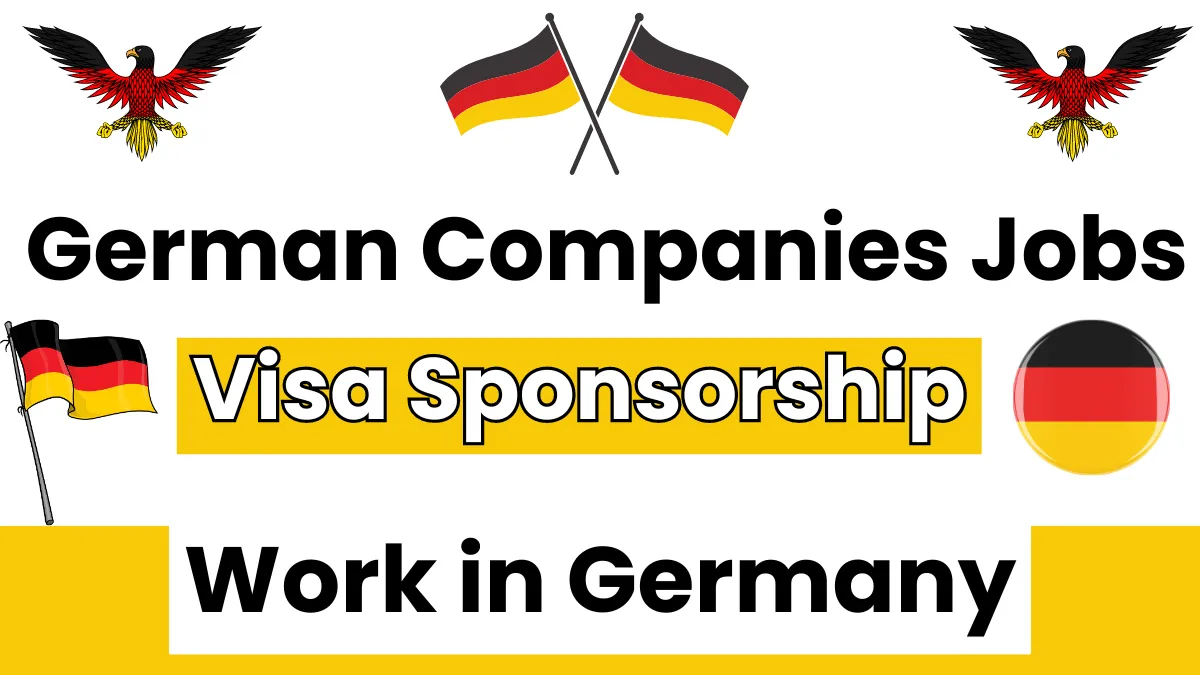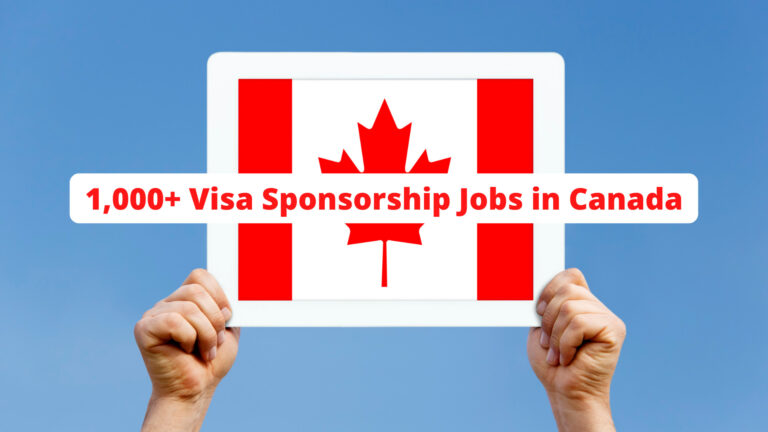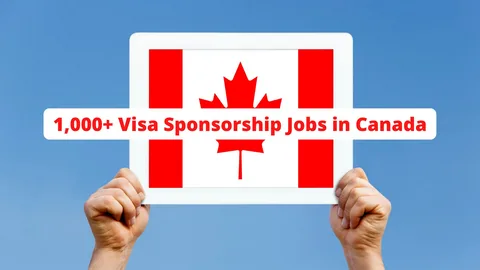Job Opportunities in Germany for Foreigners with Visa Sponsorship
Germany is one of the best countries in Europe for foreigners looking for job opportunities. With a strong economy, a high standard of living, and a welcoming environment, many people from around the world choose to work in Germany. This guide will provide detailed information about job opportunities, visa sponsorship, benefits of working in Germany, application processes, visa requirements, and answers to common questions.
Why Choose Germany?
Germany is a great place to live and work for several reasons:
- Strong Economy: Germany has the largest economy in Europe. It has a low unemployment rate and a growing demand for skilled workers in various industries.
- High Quality of Life: Germans enjoy excellent healthcare, education, and public services. Cities like Munich, Berlin, and Frankfurt regularly rank high for quality of life.
- Cultural Diversity: Many foreigners live and work in Germany. The country is known for its rich history, art, and culture, making it an exciting place to experience new things.
- Work-Life Balance: German companies value work-life balance. Employees typically enjoy reasonable working hours, generous vacation days, and parental leave.
- Language Opportunities: While German is the main language, many companies, especially international ones, use English as their working language. This makes it easier for non-German speakers to find jobs.
Job Opportunities for Foreigners in Germany
There are many job opportunities for foreigners in various sectors. Here are some of the most popular fields:
1. Information Technology (IT)
The IT sector is booming in Germany. There is a high demand for skilled professionals in areas such as:
- Software Development: Programmers and developers who know languages like Java, Python, or JavaScript are highly sought after.
- Data Science: Companies need data scientists to analyze data and help make business decisions.
- Cybersecurity: With increasing online threats, cybersecurity experts are essential for protecting sensitive information.
- Artificial Intelligence (AI): Specialists in AI and machine learning are in demand as companies invest in new technologies.
2. Engineering
Germany is famous for its engineering expertise, particularly in the automotive sector. Job roles include:
- Mechanical Engineering: Positions involve designing and developing machines and mechanical systems.
- Electrical Engineering: Engineers work on electrical systems, including power generation and electronics.
- Civil Engineering: There are opportunities in designing and building infrastructure like roads, bridges, and buildings.
- Automotive Engineering: Engineers design and develop vehicles for leading automotive companies.
3. Healthcare
The healthcare industry is growing rapidly, creating many job opportunities for:
- Doctors: Medical professionals in various fields, especially specialists, are in demand.
- Nurses: Registered nurses and caregivers are needed to support patients in hospitals and homes.
- Medical Technicians: These specialists work in laboratories and hospitals to assist with diagnostics and treatments.
4. Finance and Banking
Germany is a key financial center in Europe. Job opportunities include:
- Accountants: Skilled accountants are needed for financial reporting and auditing.
- Financial Analysts: Analysts assess financial data to help companies make investment decisions.
- Insurance Specialists: There are roles in underwriting, claims processing, and policy management.
5. Manufacturing
Germany is known for its strong manufacturing sector, especially in automotive and machinery. Job roles include:
- Production Managers: Overseeing manufacturing processes and ensuring efficiency.
- Quality Control Inspectors: Ensuring products meet quality standards.
- Logistics Managers: Managing supply chains and distribution processes.
6. Education
There is a demand for teachers in Germany, particularly in international schools and language institutes. Opportunities include:
- Language Teachers: Teaching English or other foreign languages to students.
- University Professors: Teaching at universities and conducting research.
- Vocational Trainers: Instructing students in practical skills for various trades.
Benefits of Working in Germany
Working in Germany comes with many advantages:
- Attractive Salary Packages: Salaries in Germany are competitive, often higher than in many other countries. Employees also receive benefits such as bonuses and health insurance.
- Job Security: German labor laws protect employees, providing rights and benefits that ensure job security.
- Path to Permanent Residency: Working in Germany can lead to permanent residency or citizenship, allowing you to live in the country long-term.
- Professional Development: Germany offers numerous training programs and workshops to help you enhance your skills and advance your career.
- Rich Cultural Experiences: Living in Germany allows you to explore its rich history, festivals, art, and delicious food.
What Is Visa Sponsorship?
Visa sponsorship is the process by which an employer helps a foreign worker apply for a visa to work in Germany. Here’s how it works:
- Job Offer: You need a job offer from a German employer willing to sponsor your visa.
- Employer Responsibilities: The employer must prove they could not find a suitable candidate within the European Union (EU) before hiring a non-EU applicant.
- Legal Support: Employers often assist you in navigating the visa application process, making it easier for you.
Types of Work Visas in Germany
Germany offers several types of work visas for foreigners. Here are the main ones:
1. EU Blue Card
The EU Blue Card is for highly skilled workers. To qualify, you need:
- A job offer with a minimum salary.
- A recognized university degree or a comparable qualification.
2. Employment Visa
This visa is for skilled workers who have a job offer in Germany. You need to meet specific qualifications and have a signed job contract.
3. Job Seeker Visa
This visa allows you to enter Germany for six months to look for a job. To qualify, you need:
- A recognized qualification or degree.
- Proof of financial means to support yourself during your stay.
4. Intra-Company Transfer Visa
If you work for a multinational company and are being transferred to a German branch, you can apply for this visa.
How to Apply for a Job with Visa Sponsorship
Applying for a job in Germany with visa sponsorship involves several steps:
1. Research Job Opportunities
Start by looking for job openings that match your skills. Use job portals, company websites, and recruitment agencies.
2. Tailor Your Application
Customize your CV and cover letter for each application. Highlight relevant skills and experience that match the job description.
3. Submit Your Application
Apply directly through company websites or job portals. Follow application instructions carefully to avoid mistakes.
4. Prepare for Interviews
If you are invited for an interview, research the company and practice common interview questions. Be ready to discuss your experience and qualifications.
5. Receive Job Offer and Sponsorship
If selected, you will receive a job offer, and your employer will begin the visa sponsorship process.
Visa Requirements for Germany
To work in Germany, you must meet specific visa requirements:
1. Valid Job Offer
You must have a job offer from a German employer who is willing to sponsor your visa.
2. Qualifications and Skills
You need to provide proof of your qualifications and skills that match the job requirements, including:
- Educational certificates
- Professional experience
- Language proficiency (German or English, depending on the job)
3. Health Insurance
You must have health insurance coverage to obtain a work visa.
4. Financial Stability
You may need to show proof of financial means to support yourself while in Germany.
5. Language Proficiency
While many companies use English, knowing German can improve your job prospects and help you integrate into society.
How to Apply for a Visa Sponsorship
The process for applying for visa sponsorship includes several steps:
1. Gather Required Documents
Prepare all necessary documents for your visa application. This may include:
- A valid passport
- Job offer letter
- Academic and professional certificates
- Proof of health insurance
- Financial statements
2. Submit Visa Application
Apply for your visa at the German embassy or consulate in your home country. Make sure to complete the application form accurately and provide all required documents.
3. Attend Visa Interview
You may be required to attend an interview at the embassy or consulate. Be prepared to answer questions about your job, qualifications, and intentions in Germany.
4. Wait for Processing
The visa processing time can vary. Be patient and ensure you have a valid passport throughout the process.
5. Obtain Your Visa
Once approved, you will receive your visa, allowing you to travel to Germany and start your new job.
Common FAQs About Job Opportunities and Visa Sponsorship in Germany
1. What types of visas are available for foreign workers in Germany?
There are several types of work visas, including the EU Blue Card, Employment Visa, Job Seeker Visa, and Intra-Company Transfer Visa.
2. How long does the visa sponsorship process take?
The processing time can vary based on the type of visa and the workload of the embassy. Generally, it takes several weeks to a few months.
3. Do I need to speak German to work in Germany?
While many companies operate in English, learning German can significantly enhance your job prospects and help you settle in.
4. Can my family join me in Germany?
Yes, your family can apply for family reunification visas to join you in Germany.
5. Are there any fees associated with visa applications?
Yes, visa applications usually require a fee, which varies based on the type of visa and processing time.
6. What documents do I need for the visa application?
You will need a valid passport, job offer letter, academic certificates, proof of health insurance, and financial statements.
7. How can I improve my chances of getting a job in Germany?
To improve your chances, tailor your CV and cover letter, network with professionals in your field, and consider learning German.
Conclusion
Germany offers a wealth of job opportunities for foreigners, especially with visa sponsorship. The country’s strong economy, high quality of life, and cultural diversity make it an ideal destination for skilled workers. By understanding the job market, familiarizing yourself with the visa sponsorship process, and utilizing available resources, you can successfully find a job in Germany. Remember to tailor your applications, prepare for interviews, and embrace the local culture. Good luck on your journey to working in Germany!






